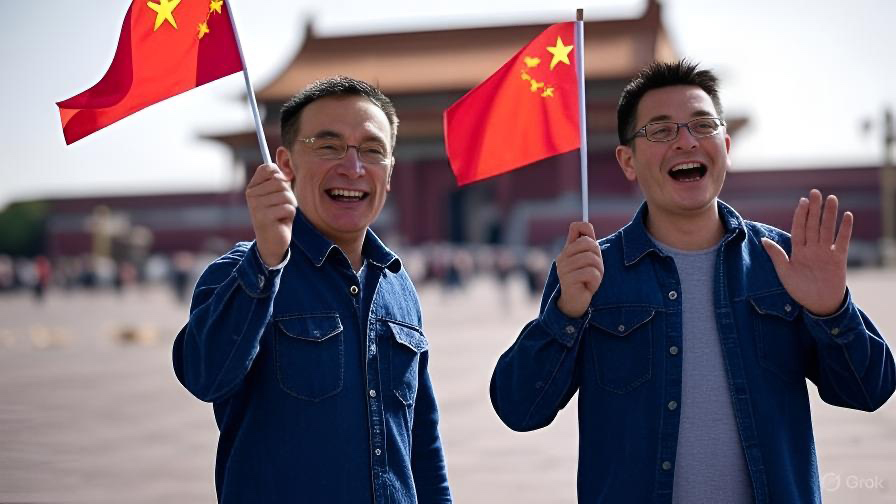The banter at communist military parades must be challenging at the best of times. One wrong word to Kim Jong Un as the collected firepower of North Korea rolls past at Kim Il-sung Square, Pyongyang, for example, and the Respected Comrade will have you clapped in cuffs and appoint you to the role of target practice for the infantrymen looking for a way to unwind after marching wearily back to the barracks.
Luckily for former Australian foreign minister Bob Carr and former Victorian premier Dan Andrews, their attendance tomorrow at the 80th anniversary in Tiananmen Square, Beijing, of the Japanese being driven out of China in World War II won’t be quite so perilous.
For one, they are both world-class China suckholes who remain idiotically useful in China’s plan to subordinate Australia into its dominance of the region, so even a careless accidental remark about communication devices found in Chinese-made solar panels, Chinese police stations operating in Australia or the military benefits of the Port of Darwin probably won’t be enough for them to receive the Yang Hengjun treatment.
For another, their Chinese counterparts will be eager to extract from them firsthand accounts of the current state of Australia, the sort of observations that simply can’t be conveyed by crude listening devices in Chinese-made cars and office equipment.
Andrews and Carr will be more than pleased to relay to them stories of Australia’s rapid decline into a fractious, indebted, unproductive, neurotic nation that will soon be as dependent on Chinese largesse as heroin junkies to a benevolent dealer.
But still, you’d have to imagine even Andrews and Carr will pause as they cheer the militaristic hardware and colourful displays of national, communist pride. This is, after all, the exact opposite of what they preach to their compatriots in the multicultural utopia back home.
And this is where they could easily come unstuck. One remark about diversity being a greater strength than all this uniformed goose-stepping unity and they would be strapped to a gurney and be donating their organs before the parade was over. Not their spines, though, obviously.
But you don’t need to have a front-row seat at a parade by the fastest growing military in history to think that, by comparison, multiculturalism is a pathetic, insipid, even flaccid template for a society. You just have to look around Australia any day of the week. While China barely tolerates jaywalking, we are treated to daylight carjackings, pedophile rapes, machete attacks and particularly gruesome murders filling our tabloids on a daily basis.
One of the few bright sides of all the multicultural crime our leaders have unleashed upon us is that the largest cohort of immigrants in this age of mass migration — Indians — are seldom the perpetrators. Indians generally have a reputation for being benign immigrants — Uber drivers mumbling incoherently into their mobile phones notwithstanding — who keep to their own without causing the rest of us much trouble.
And there is even a reasonable amount of them who are wonderfully grateful to be here and eager to assimilate, like this lovely lady I met at the March for Australian on Sunday, whose video has gone viral on social media.
Prime Minister Anthony Albanese is presumably relying upon this relatively harmonious image to help his secret plan to import hundreds of thousands of Indian construction workers to build a million houses somewhere in Australia pass the pub test when he finally gets around to telling us about it.
Not so fast, though. One Indian called Jayant Bhandari says this would be a disastrous miscalculation. He has made something of a side career telling the world not to trust Indians because they come from “an amoral, irrational society devoid of values”.
Here, he recalls his first day outside India, when he migrated to Manchester, England, as a young man, and how the enlightenment of the West had little or no influence on his countrymen:
On a train trip from Heathrow Airport to Manchester, I saw what I initially thought were dull-looking houses and clean, unremarkable waterways and air. The lack of hustle and bustle and the calmness of the train ride left me feeling disoriented and gloomy. I didn’t know how to cope with a situation where there was no constant assault on my senses.
With time, I realised that for most Indian immigrants, this led to a compulsive need to recreate India in the ghettos they moved into. They sought the familiar smells, noise, and constant hustle and bustle. They recreated never-ending emotionalism, fruitless conflicts, chaos, and intellectual inbreeding.
When we were granted unhindered access to the school in Manchester and later to the office where I worked, my fellow immigrants and I often wondered if the British were so naïve as to trust us so readily. What was to stop us from stealing everything in sight? Most immigrants never truly grasp the significance of “trust” and “gratitude.” Worse, they discover that complaining often leads to benefits — the only thing they genuinely care about in the multicultural West. Humanistic, civilisational values never touch their hearts.
If you think all cultures are equal, then you will probably not be perturbed by people who bring “fruitless conflicts” and a propensity to cash in on victimhood into your neighbourhood.
If, however, you think that Western Civilisation is superior, and would like Australia to remain a civilised, trustworthy society based on Christian values, then this deal to flood yet more unassimilated Indians into Australia will strike you as an act of historic and possibly fatal treachery.


